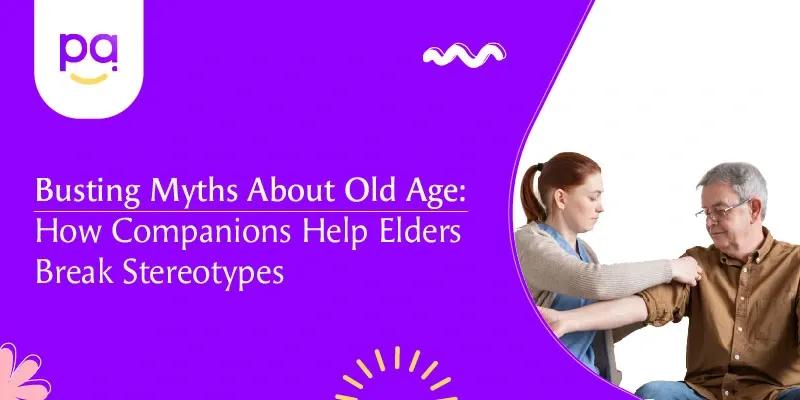Busting Myths About Old Age: How Companions Help Elders Break Stereotypes
In This Article
Busting Myths About Old Age: How Companions Help Elders Break Stereotypes
Pragati
Updated on February 12, 2025
Medically verified by
Fact checked by

General
6 min read
Myths and beliefs about old age have long fooled people that it is a period of deterioration, loneliness, and detachment. These ideas have influenced older persons' self-perceptions as well as society opinions.
Nonetheless, friends, family, and caregivers all play a crucial part in assisting seniors in overcoming these misconceptions and leading active, satisfying lives.
Further, the most widespread misconceptions about aging, dispute them with data, and demonstrate the transformative power of companionship.
Myth 1: Old Age Means Decline and Irrelevance
One of the most pervasive myths about old age is that it inevitably leads to physical and mental decline. While it is true that aging comes with some changes in physical health, this does not mean that older adults are doomed to a life of deterioration.
Many older people remain active, sharp, and capable well into their later years.
The Role of Pa Companions:
-
Having pa companions will encourage an active lifestyle, whether through daily walks, stimulating conversations, or shared hobbies, and this makes a significant impact.
-
Social engagement is directly linked to cognitive health in older adults.
-
Pa companions engage elderly in regular interaction which helps them to keep the mind sharp, as it encourages the use of cognitive faculties like memory, reasoning, and problem-solving .
-
Also, we serve as a support system for pursuing hobbies, exercising, and staying engaged with the community.
Myth 2: Elders Are Lonely and Isolated
Another familiar presents old age as a time of loneliness and solitude. While it’s true that some seniors may endure social isolation, particularly after the loss of a spouse or friends, this narrative doesn’t apply to everyone.
The role of Pa Companions:
-
By offering social and emotional support, Pa companions lessen feelings of loneliness.
-
We offer our companionship services by visiting regularly, engaging in discussion, and sharing activities.
-
Furthermore, technology is becoming a more useful tool for keeping older individuals connected.
-
Social networking, video calls, and even online gaming platforms let seniors communicate with loved ones from a distance.
-
Such encounters produce a sense of belonging and togetherness that challenges the idea of alone time.
Myth 3: Elders Can’t Learn New Things
The concept that older folks are incapable of learning new skills or adapting to technology is antiquated. Although learning may take longer due to changes in cognitive function, older persons are more than capable of acquiring new knowledge and abilities.
The Role of Pa Companions:
-
Pa Companions help elders learn and grow by teaching them new things or encouraging them to take up new hobbies.
-
Whether it’s learning or even engaging in other stuff, having a PA companion to guide and encourage them can make a world of difference.
-
Therefore, with the correct encouragement, elders can continue growing intellectually and emotionally throughout their lives.
Myth 4: Elders Don’t Contribute to Society
The misconception that older people can no longer make significant contributions to society is another harmful one. Seniors are frequently portrayed in this stereotype as a burden rather than as people having important information, experience, and time to share.
The Role of Pa Companions:
-
Elders having Pa companions greatly benefit from their assistance in preserving their sense of purpose.
-
Many elderly people have special abilities or knowledge that they may impart, such as mentoring youth, involvement in neighborhood associations, or even supporting their own families with counsel and insight.
Myth 5: Elders Are a Burden on Healthcare
A commonly held misconception is that elderly people are a financial burden on society and require a disproportionate amount of healthcare resources.
The Role of Companions:
-
By being proactive in their support, Pa companions assist older individuals maintain their health.
-
Pa Companions immensely lessen the strain on healthcare systems by supporting individuals in adhering to recommended medications, supporting them to medical appointments, or promoting healthy lifestyle choices.
-
Pa Companions help seniors to maintain an active lifestyle, consume a balanced diet, and learn stress management techniques—all of which improve overall health and reduce reliance on medical services.
Myth 6: Elders Are Set in Their Ways
People are said to get less receptive to new ideas and more conservative in their thinking as they get older. This misconception promotes the common image of older people as stiff and disconnected from contemporary society.
The Role of Pa Companions:
-
Elders who have Pa companions remain receptive to fresh perspectives and experiences.
-
Pa Companions dispel the myth that elderly people are set in their ways by having thought-provoking discussions, offering fresh viewpoints, and promoting curiosity.
-
A lot of senior citizens are receptive to change, particularly when it is offered in an atmosphere of support.
-
Especially when kids believe that their experiences and ideas are appreciated, they are frequently more adaptive than we realize.
Myth 7: Older Adults Are Always Depressed
Partly due to the belief that loneliness and loss are inherently depressing, depression is frequently linked to aging. Depression is not an prevalent condition among the elderly, although it does affect some of them.
The Role of Pa Companions:
-
Older persons who experience depression can benefit greatly from our Pa companionship.
-
Depressing and dismal feelings can be avoided or lessened with a solid support or companion.
-
In addition to providing emotional support, Pa companions promote optimistic thinking and a feeling of connectedness that helps prevent depression.
-
An elderly person's attitude can be greatly impacted by something as basic as spending time with them, joking, or sharing memories and this can be possible by having a Pa companion.
 3 min read
3 min readHow Companionship Benefits the Elderly
 7 min read
7 min readCare For Your Family From Anywhere: Pa Companions Are Here For You
 7 min read
7 min readEmpowering Elders: The Role of Companionship
Get a Callback Now
Conclusion
Old age has been presented by myths and stereotypes as a time of degradation and loneliness, and disengagement.
The reality is, however, much more complex and favorable. Throughout their lives, older persons can continue to learn, develop, contribute, and build meaningful relationships.
In removing these illusions, Pa companions are essential. Our Pa Companions provide seniors with the support, motivation, and engagement opportunities they need to live happy, active, and purposeful lives.
It's time to dispel myths and acknowledge that growing older does not equate to inevitable decline but rather to ongoing possibility and growth.
Pa Companions help elderly to stay active and mentally sharp.
Pa Companionship keeps seniors socially connected and supported.
Elders continue learning and contributing with the right encouragement.
Pa Companions promote health, reducing dependency on medical services.
Source Links
National Library Of Medicine
Harvard T.H Chan
American Psychological Association

